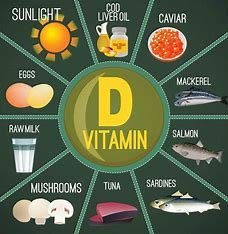Vitamin D is a crucial fat-soluble vitamin that plays multiple roles in maintaining overall health, particularly in bone and immune system function.

- Bone Health: Vitamin D is essential for absorbing calcium and phosphorus, which are vital for maintaining healthy bones and teeth. It helps prevent bone deformities such as rickets in children and osteomalacia in adults, and it protects against osteoporosis in older adults by promoting bone remodeling and mineralization.
- Immune Function: This vitamin modulates the immune system, enhancing the body’s ability to fight infections. Vitamin D receptors are present in various immune cells, indicating its role in immune response regulation.
- Muscle Function: Adequate vitamin D levels are necessary for muscle strength and function, helping to reduce the risk of falls in older adults.
- Cell Growth Regulation: Vitamin D influences cell proliferation and differentiation, impacting neuromuscular function and glucose metabolism.
Sources of Vitamin D
Vitamin D can be obtained through various means:
- Sunlight: The body synthesizes vitamin D when the skin is exposed to ultraviolet (UV) rays from sunlight. This natural production is a primary source for many individuals.
- Dietary Sources: Foods rich in vitamin D include:
- Fatty fish (e.g., salmon, mackerel)
- Cod liver oil
- Fortified foods (e.g., milk, orange juice)
- Egg yolks
- Mushrooms are exposed to UV light.
- Supplements: Vitamin D supplements (D2 or D3) can help individuals who are at risk of deficiency, especially during months with limited sunlight exposure.
Recommended Daily Intake
The recommended daily allowance (RDA) varies by age:
- Children (ages 1-18): 600 IU (15 mcg)
- Adults (ages 19-70): 600 IU (15 mcg)
- Adults over 70: 800 IU (20 mcg).
Deficiency Risks
Vitamin D deficiency can lead to serious health issues such as:
- Increased risk of fractures
- Weakened immune response
- Muscle weakness
- Bone pain or deformities.
Certain populations are at higher risk for deficiency, including older adults, individuals with limited sun exposure, and those with specific medical conditions affecting absorption.
In summary, maintaining adequate levels of vitamin D is essential for bone health, immune function, and overall well-being. Regular sun exposure, a balanced diet rich in vitamin D sources, and appropriate supplementation can help achieve sufficient levels.
